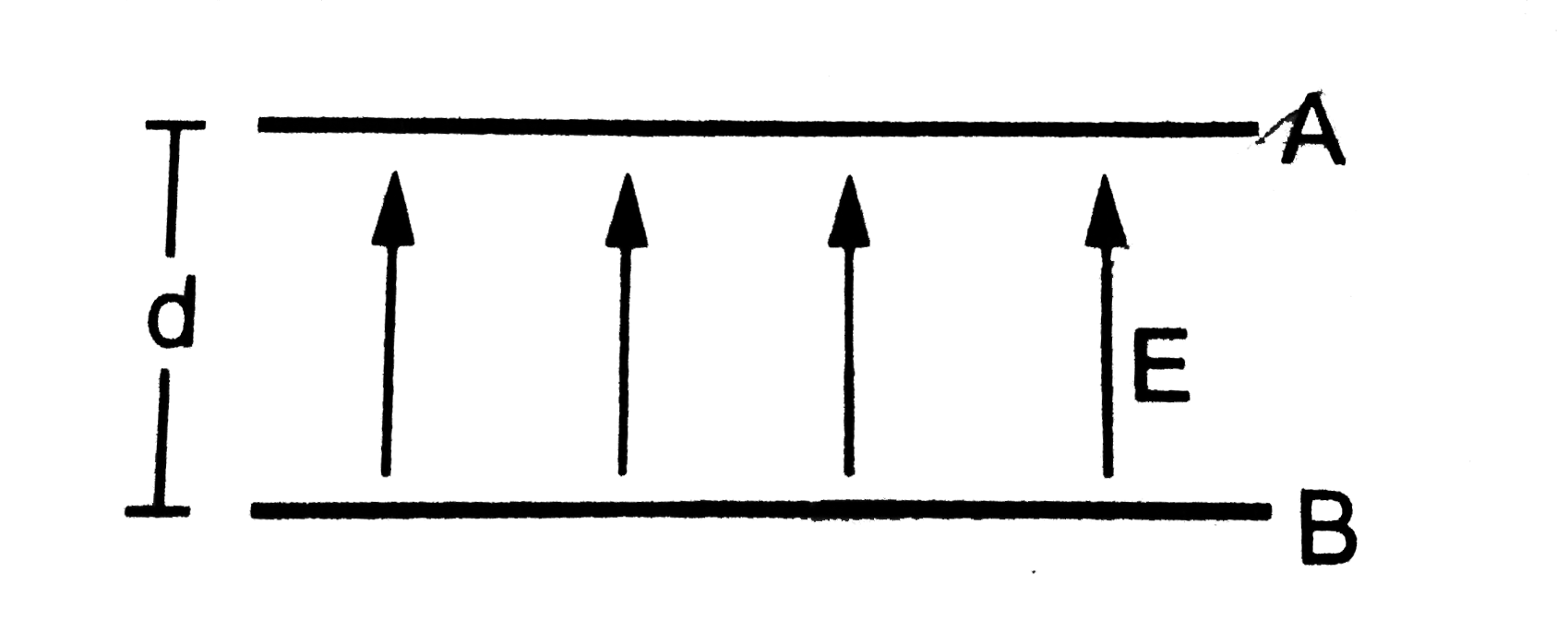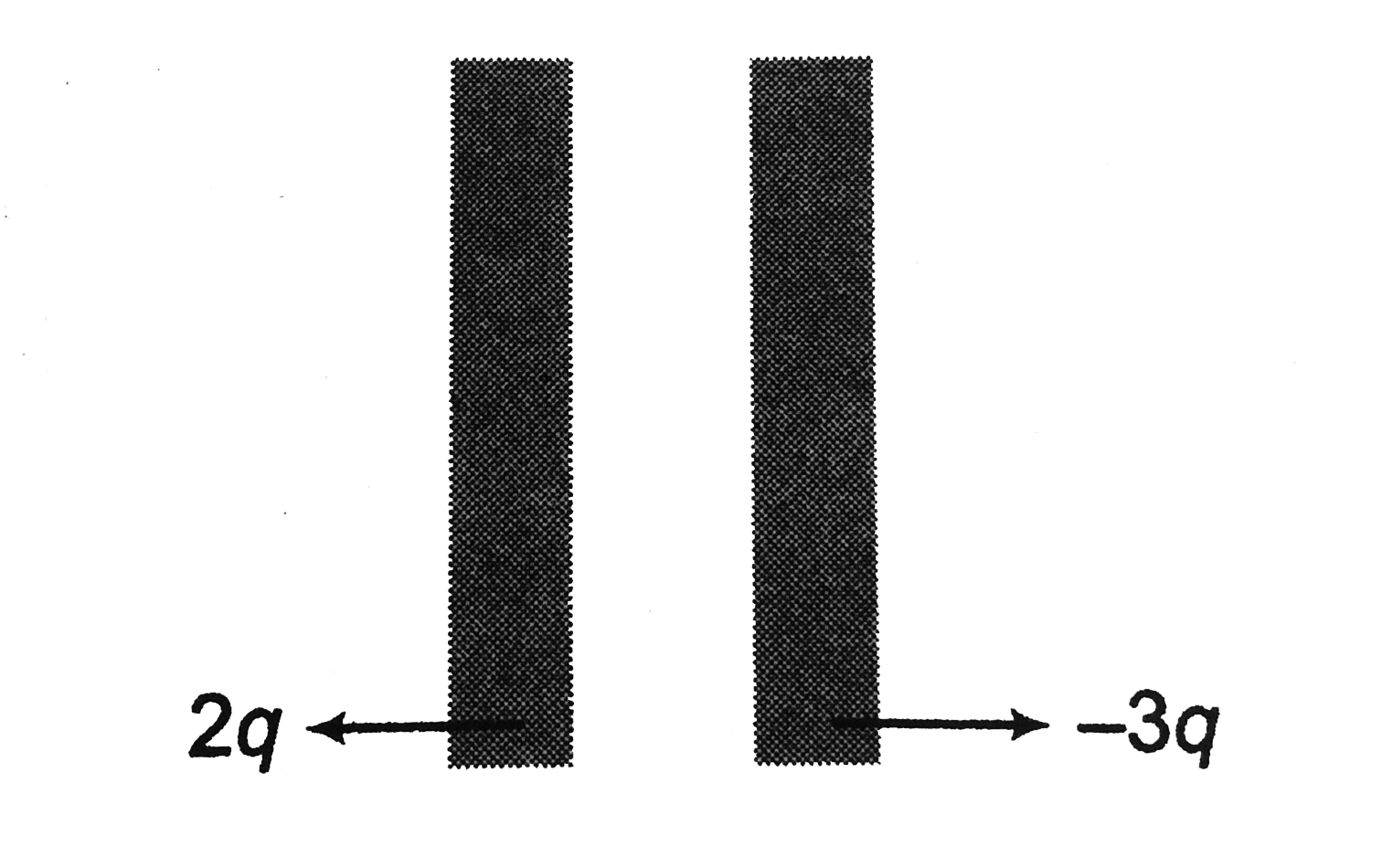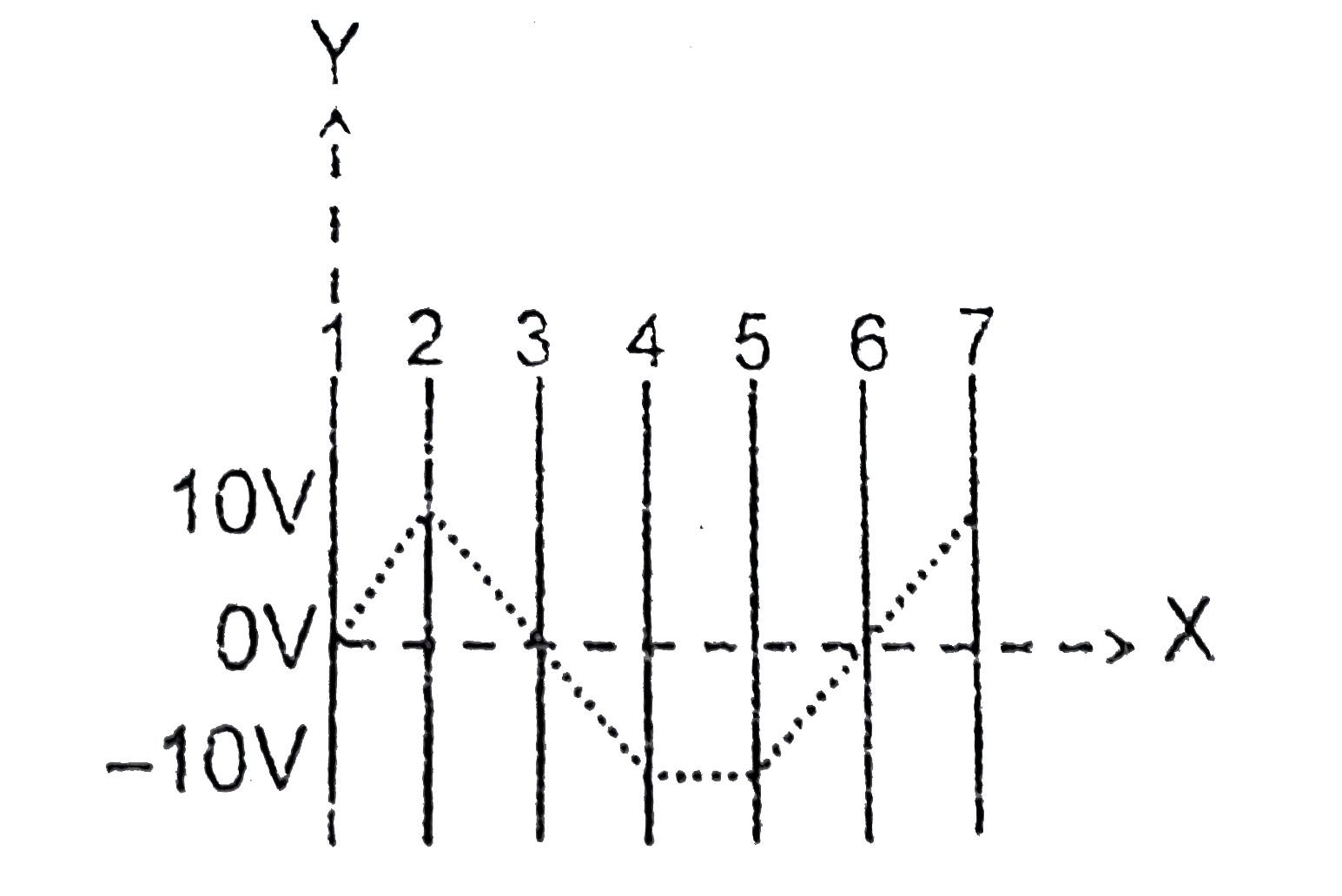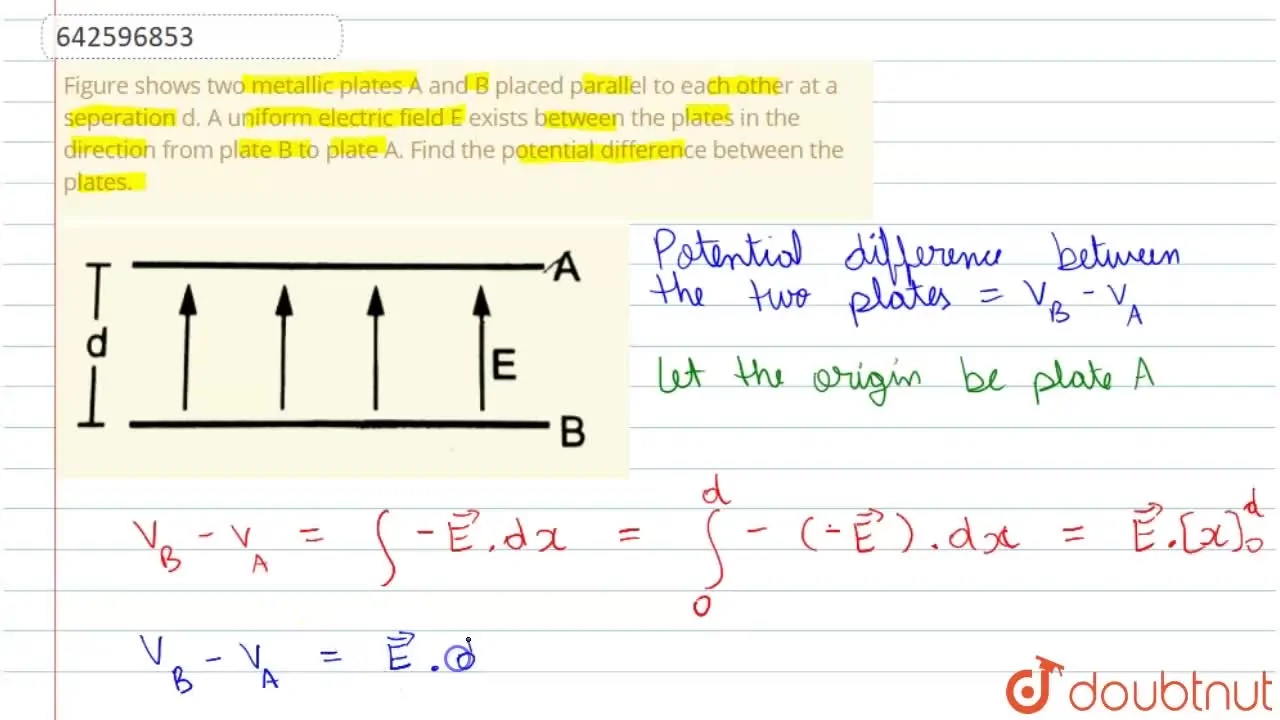Figure shows two metallic plates A and B placed parallel to each other at a seperation d. A uniform electric field E exists between the plates in the direction from plate B to plate A. Find the potential difference between the plates.

Let us take the origin at plate a and x-axis
along the direction from plate A to plate B. We have
VB−VA=−∫rBrA→Ed→r=−∫d0−Edx=Ed.<br>ifwework∈Cartesianc∞rd∈atesystem<br>E = E_x veci +E_y vec j +E_z veck<br>anddvecr = dx veci +dy vecj +dz veck.<br>Thusom<br>dV = E_x dx- E_y dy-Ez dz. (i)<br>Ifwechan≥x→x+dxkeeπngyandzconstant,<br>dy=dz=0andom(i),<br>|(E_x=-(delV)/(delx)),(E_y=-(delV)/(dely)),(E_z = -(delV)/(delz))|<br>Thesymbols(del)/(delx), (del)/(dely)ect.areused→∈dicatetˆ<br>whi≤d⇔erentiat∈gwithrespect→o≠c∞rd∈ate,theotherarekeptconstant.<br>ifweknowthee≤ctricfield∈aregion,wecan<br>f∈dthee≤ctricusingequationand<br>ifweknowthee≤ctr∈cpotential∈aretgion,wecanf∈dthee≤ctricfieldusing<br>Equationmayalsobewrienas<br>dV = -E dr cos theta<br>Wherethetaisthe∠betweenthefieldvecEandthesmall<br>displacementdvecr.Thus.<br>-(dV)/(dr) = E cos theta<br><imga≤ocr_imageload∈g=lazysrc=https://d10lpgp6xz60nq.cloudfront.net/physics_images/HCV_VOL2_C29_S01_005_S01.pngwh=80%mx-autosty≤=background:white;>Weseetˆ,-(dV)/(dr)givesthecomp≠ntofthee≤ctric<br>field∈thedirectionofdisplacementdvecr.InweshowasmalldisplacementPP'=dr.Thee≤ctricfield<br>isEmak∈gan∠thetawithPP.'wehave<br>dV = V(P,) - V(P)<br>sotˆ(V(P) - V(P))/(dr) = E cos theta.<br>Thisgivesusamethod→≥tthecompo≠ntfo<br>thee≤ctricfield∈anygivendirectionifweknowthe<br>potential.MOveasmalldistancedr∈thegiven<br>directionandseethechan≥dV∈thepotential.The<br>compo≠ntofe≤ctricfieldalongtˆdirectionis<br>(dV)/(dr).<br>Ifwemoveadistancedr∈thedirectionofthe<br>field,thetaiszeroand -(dV)/(dr) = Eismaxiμm.Thusthe<br>e≤ctricfieldisalongthedirection∈whichthepotentialdecreaseatthemaxiμmrate.<br>Ifamalldisplacementdvecrperpendica––r→the<br>e≤ctricfieldisconsred,theta = 90^@and<br>dV = -vecE.dvecr = -0. The potential does not vary in a
direction perpendicular to the electric field.
Related Playlists
- BOOK - HC VERMA ENGLISHCHAPTER - ELECTRIC FIELD AND POTENTIALEXERCISE - worked out Examples19videos
ELECTRIC FIELD AND POTENTIAL
- BOOK - HC VERMA ENGLISHCHAPTER - ELECTRIC FIELD AND POTENTIALEXERCISE - Exercises75videos
ELECTRIC FIELD AND POTENTIAL
- BOOK - HC VERMA ENGLISHCHAPTER - ELECTRIC CURRENT THROUGH GASESEXERCISE - Short answer6videos
ELECTRIC CURRENT THROUGH GASES
- BOOK - HC VERMA ENGLISHCHAPTER - ELECTROMAGNETIC INDUCTIONEXERCISE - Questions for short answer9videos
ELECTROMAGNETIC INDUCTION
Similar Questions
A parallel plate capacitor has a uniform electric field E in the space between the the plates. If the distance between the plates is d and area of each plate is A, the energy stored in the capacitor is
View SolutionCharges 2q and −3q are given to two identical metal plates of area of cross section A. the distance between the plates is d. Find the capacitance and potential difference between the plates.
 View Solution
View SolutionThe force between the plates of a parallel plate capacitor of capacitance C and distance of separation of the plates d with a potential difference V between the plates, is.
View SolutionThe diagram shows an arrangement of identical metal plates placed parallel to each other and the variation of potential between the paltes by dotted lilne. Using the details given in diagram, the equivalent capacitance connected across the plate No. 2 and plate No. 4 is

(Separation between the consecutive plates =L, area of each plate =A)View SolutionA charge of 1μC is given to one plate of a parallel - plate capacitor of capacitance 0.1μF and a charge of 2μC is given to the other plate . Find the potential difference developed between the plate .
View SolutionIn a parallel plate capacitor of capacitor 1μF two plates are given charges 2μC and 4μC the potential difference between the plates of the capacitor is
_2019_CBT2_E01_002_Q01.png) View Solution
View SolutionTwo plates are 2cm apart, a potential difference of 10 volt is applied between them, the electric field between the plates is
View SolutionTwo large conducting plates of a parallel plate capacitor are given charges Q and 3Q respectively. If the electric field in the region between the plates is E0 , then the force of interaction between the plates is
 View Solution
View SolutionFive identical plates each of area a are joined as shown in the figure. The distance between the plates is d. the plates are connected to a potential difference of V volt. The charge on plates 1 and 4 will be
 View Solution
View SolutionFour parallel large plates separated by equal distance d are arranged as shown in. The area of the plates is S Find the potential differnce between plats BandC if plate B is given a charge Q.
 .View Solution
.View Solution


